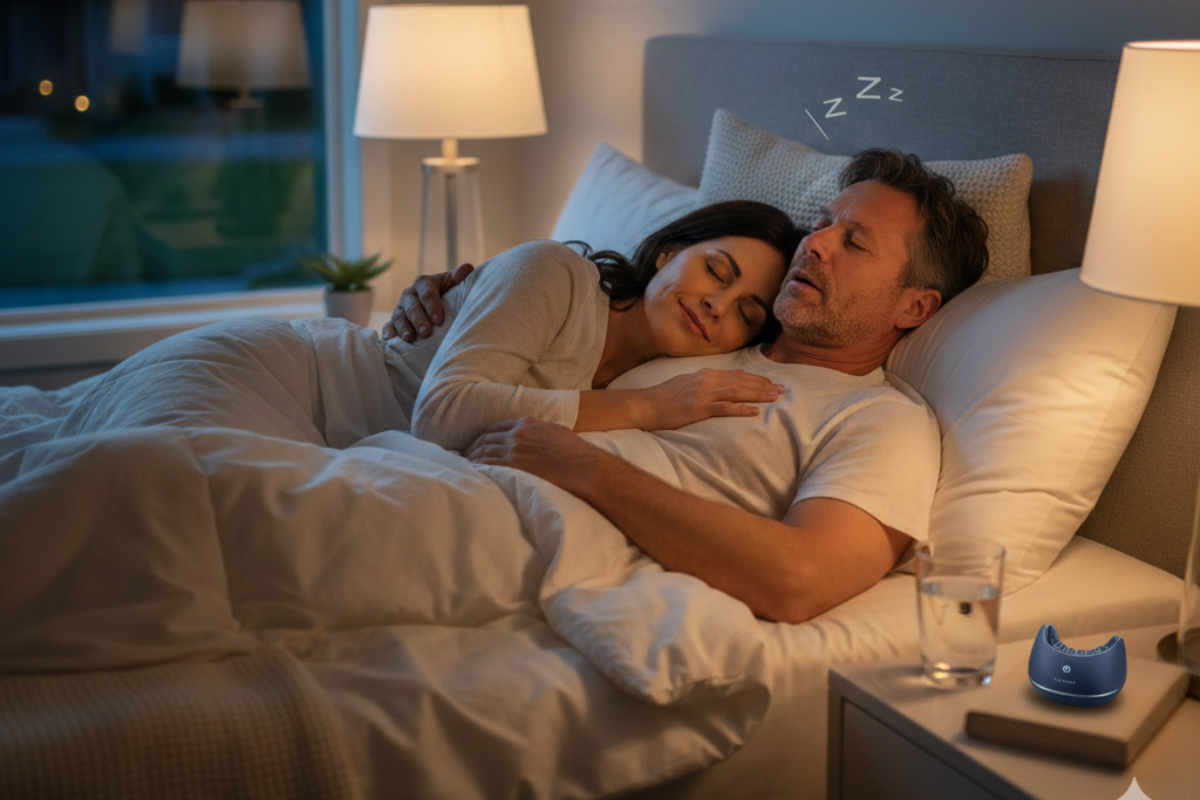Free Shipping - On Orders Over $99 (USA, Canada, UK, & AU)

Do Anti-Snore Sprays Work?
August 24, 2022 3 min read
Snoring is a common annoyance. An estimated 40% of women and up to 57% of men admit that they snore, at least occasionally. In most of these cases, however, snoring is benign and nothing to worry about. But if you snore on most nights or sleep next to someone who does, you’ll probably want to seek out a solution for your chronic snoring problem.
A seemingly popular anti-snoring solution that you might come across is anti-snoring sprays. These products are said to stop snoring by lubricating and decongesting the upper airways. But are they worth your money or should you consider investing in something else?
What Are Anti-Snore Sprays?
Anti-snore sprays are medicated or non-medicated products that are sprayed into your upper airways to help stop snoring. They fall into two main categories: nasal sprays and throat sprays.
Nasal sprays prevent snoring mainly caused by allergies, sinus infections, or upper respiratory tract infections. There are many different categories of nasal sprays, containing various ingredients that decongest the nose by reducing inflammation or mucus production. Common ingredients found in these sprays include essential oils, antihistamines, anticholinergic, steroids, and saline.
Throat sprays, on the other hand, are meant to be sprayed into the back of your throat or soft palate. These promise to stop snoring by tightening and lubricating the soft palate, thus minimizing friction that’s behind most snoring. Most throat sprays on the market are made with a combination of hydrating and coating ingredients and essential oils.
Do Anti-Snore Sprays Work?
Nasal sprays, in particular, may work if your snoring is due to nasal congestion. Some studies have even found these sprays to be effective against some cases of sleep apnea with rhinitis. But if your snoring isn’t due to a blockage in your nose, but rather from something else, then nasal sprays would be a waste of money.
And as far as throat sprays go, there’s little evidence to support marketing claims regarding how these sprays combat snoring. The lubrication and alleged tightening provided by throat sprays can’t help open up the upper airway to allow normal airflow. And that’s simply because most snoring is a result of tissues in the back of the throat being weak and collapsing, thus obstructing normal airflow. This can happen for a range of reasons: weakening of throat muscles, excess neck fat, having a long palate, or drinking too much alcohol — not a lack of lubrication.
And if you want to look at the evidence: a 2003 clinical trial in Otolaryngology—Head and Neck Surgery found that these products don’t make any difference in a person’s snoring. Furthermore, a double-blinded, placebo-controlled, crossover trial published a year later in the same journal found that lubricant-based sprays demonstrate a lack of subjective and objective efficiency.
What to Try Instead
Most snoring is an occasional and benign problem. But if you or your bed partner snore frequently and loudly, you might want to speak to your doctor because this type of snoring is one of the first signs of obstructive sleep apnea (OSA), which is a serious condition that warrants immediate treatment.
Otherwise, the Good Morning Snore Solution tongue-stabilizing device has been clinically proven to work against simple snoring and mild to moderate sleep apnea. The device is easy and simple to use and can help you and your bed partner get the recuperating sleep you need and deserve.
References:
Schwab RJ. Snoring. Merck Manual Professional Version. Last updated May 2022.
Kiely JL, Nolan P, McNicholas WT. Intranasal corticosteroid therapy for obstructive sleep apnoea in patients with co-existing rhinitis. Thorax. 2004;59(1):50-55. https://www.ncbi.nlm.nih.gov/pmc/articles/PMC1758841/
Michaelson PG, Mair EA. Popular snore aids: do they work?. Otolaryngol Head Neck Surg. 2004;130(6):649-658. doi:10.1016/j.otohns.2003.11.008
Wijewickrama RC, Blalock D, Mims JW. Study of lubricant-induced changes in chronic snorers (SLICCS). Otolaryngol Head Neck Surg. 2004;131(5):606-609. doi:10.1016/j.otohns.2004.05.024
Also in Blog

Healthy Sleep Goals For 2026
December 22, 2025 6 min read

💨 Are Your Nighttime Breathing Issues Robbing You of Your Health and Your Energy?
December 12, 2025 3 min read
Breathing issues during sleep, collectively known as sleep-disordered breathing, are a major public health concern.

Is Your Snoring a Sign of Something More Serious? Unpacking the Science of Sleep
December 05, 2025 3 min read
When you snore, what's actually happening?
Join our Insiders Club
Every week you will receive specials, discounts, and giveaways.
Categories
- Better Sleep
- depression
- Fitness
- funny animal
- Global Citizenship
- health
- Mental Health
- mouthpiece
- nutrition
- pillow
- Productivity
- relationships
- sleep
- sleep apnea
- sleep deprivation
- Sleep Tech
- snoring
- snoring humor
- snoring jokes
- snoring sounds
- stop snoring
- StopSnoringStartLiving
- technology
- Tongue displacement
- travel
- video
- Young Adult

